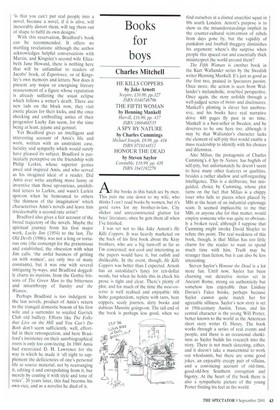Books for boys
Charles Mitchell
HE KILLS COPPERS by Jake Arnott
Sceptre, £10.00, pp.327 ISBN 0340748796
THE FIFTH WOMAN by Henning Mankell
Hamill, £16.99, pp. 437 ISBN 1860468535
A SPY BY NATURE by Charles Cummings
Michael Joseph, £9.99, pp. 416 ISBN 0718144511
HONOUR THE DEAD by Steven Saylor Constable, £16.99, pp. 438 ISBN 1841192279
1 the books in this batch are by men. This puts me one down to my wife, who thinks I can't read books by women, but it's good news for my brother-in-law, City slicker and unreconstructed glutton for boys' literature, since he gets them all when I've finished.
I was set not to like Jake Arnott's He Kills Coppers. It was heavily marketed on the back of his first book about the Kray brothers, who are a big turn-off as far as I'm concerned: not cool and interesting as the papers would have it, but oafish and dislikeable. In the event, though, He Kills Coppers was better than I expected. Arnott has an autodidact's fancy for ten-dollar words, but when he holds this in check his prose is tight and clear. There's plenty of plot, and for much of the time the mise-enscene is well realised and enjoyable: 60s Soho gangsterdom, replete with tarts, bent coppers, seedy jourrios, dirty books and dubious Masonic goings-on. The tail end of the book is perhaps less good, when we
find ourselves in a dismal anarchist squat in 80s south London. Arnott's purpose is to show us the misunderstandings implicit in the counter-cultural reinvention of rebels from days gone by, but the vapidity of punkdom and football thuggery diminishes his argument: where's the surprise when people this spaced out and essentially thick misinterpret the world around them?
The Fifth Woman is another book in the Kurt Wallander series by the Swedish writer Henning Mankell. It's just as good as the first two, praised in Spectators passim. Once more, the action is seen from Wallander's melancholic, troubled perspective. Once again, the story unfolds through a well-judged series of twists and disclosures. Mankell's plotting is clever but unobtrusive, and his books have real narrative drive: 400 pages fly past in no time. Mankell is a best-seller in Sweden, and he deserves to be one here too, although it may be that Wallander's character lacks the element of self-pity that would enable a mass readership to identify with his choices and dilemmas.
Alec Milius, the protagonist of Charles Cumming's A Spy by Nature, has bagfuls of self-pity, but unfortunately he doesn't seem to have many other features or qualities, besides a rather shallow and self-regarding intelligence. This is a deliberate, but misguided, choice by Cumming, whose plot turns on the fact that Milius is a chippy loser who falls to pieces when placed by MI6 at the heart of an industrial espionage scam. It seemed implausible to me that MM, or anyone else for that matter, would employ someone who was quite so obviously a broken reed, although I suppose that Cumming might invoke David Shayler to refute this point. The real weakness of this book, though, is that Milius has too little charm for the reader to want to spend much time with him. Truth may be stranger than fiction, but it can also be less interesting.
Steven Saylor's Honour the Dead is a lot more fun. Until now, Saylor has been churning out detective stories set in Ancient Rome, strong on authenticity but somehow less enjoyable than Lindsay Davies's Falco books, perhaps because Saylor cannot quite match her for agreeable silliness. Saylor's new story is set in 19th-century Austin, Texas, and his central character is the young Will Porter, better known to the world as the American short story writer 0. Henry. The book works through a series of real events and people, and there is an occasional clunkiness as Saylor builds his research into the story. There is not much detecting, either, and it doesn't take a mastermind to work out whodunnit, but there are some good jokes, an enjoyably creepy pair of villains, and a convincing account of old-time, good-old-boy Southern corruption and bigotry. At the heart of the book there is also a sympathetic picture of the young Porter finding his feet in the world.


































































 Previous page
Previous page